#ernst busch
Explore tagged Tumblr posts
Text
Okay, off-topic (or is it? this is the kind of stuff I listen to for inspiration), but this song is such a banger
youtube
impromptu translation:
The legend of the dead soldier - Summer 1918
And as the war in its fourth spring Did not have a prospect for peace The soldier drew his conclusion And died a hero's death.
But the war wasn't over yet So the Emperor felt sorry: That his soldier died Felt too soon to him.
Summer moved about the graves And the soldier was already asleep There, one night, came a military medical commission.
The medical commission went to the graveyard And, with a blessed spade, Dug out the fallen soldier.
The doctor thoroughly inspected the soldier Or what was left of him And the doctor found that the soldier was ready to serve And just dodging the danger.
And they immediately took the soldier with them The night was blue and beautiful If you didn't wear a helmet You could see the stars of home.
They poured strong booze Into his decayed body And put two nurses in his arms And a half-naked woman.
And since the soldier stinks of decay A priest limps in front Who waves a censer above him So he can't stink.
Forward the music Plays a lively march And the soldier, as he has learned, Throws his legs from his ass [marches quickly]
And brotherly hugging him Go two medics Otherwise he might fall into the dirt And that can't happen.
They drew on his shroud The colours black-white-red And carried it in front of him; The colours covered up the feces.
A gentleman in a tailcoat also walked in front With a stiffened chest He, as a German man, Was precisely aware of his duty.
So with music they walked Down the dark highway And the soldier staggered with them Like a snowflake in a storm.
The cats and dogs cry The rats in the field whistle wildly: They don't want to be French Because that's a disgrace.
And when they move through the villages All the women were there Trees bowed, the full moon was shining And everything yelled: 'Hurrah!'
With music and goodbyes! And woman and dog and priest! And in the midst the dead soldier Like a drunken ape.
And when they move through the villages Nobody saw him So many were around him With music and Hurrah.
So many danced and cheered around him That nobody saw him He could only be seen from above And there are only stars there.
The stars are not always there There comes a morning's red But the soldier, as he's learned Marches to a hero's death.
11 notes
·
View notes
Text




Ernst BUSCH
"Legenden, Lieder und Baladen 1914-1934"
(LP. Eterna. 1967 / rec. 1965) [DE]
youtube
3 notes
·
View notes
Photo

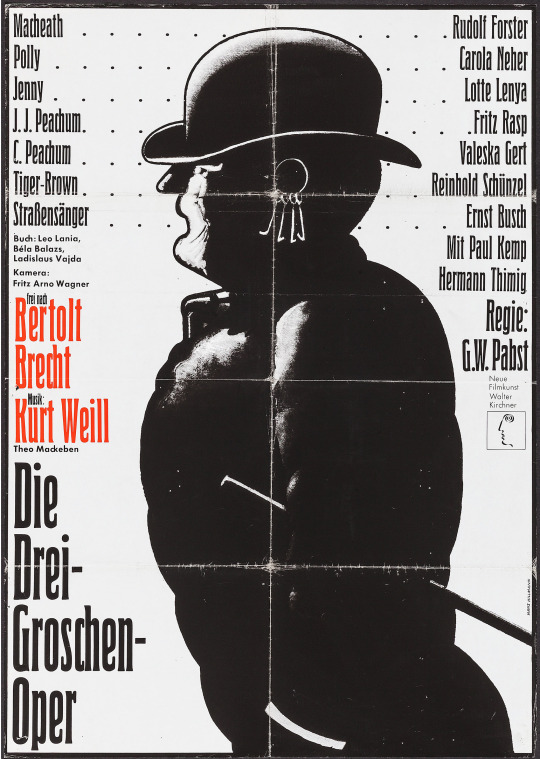
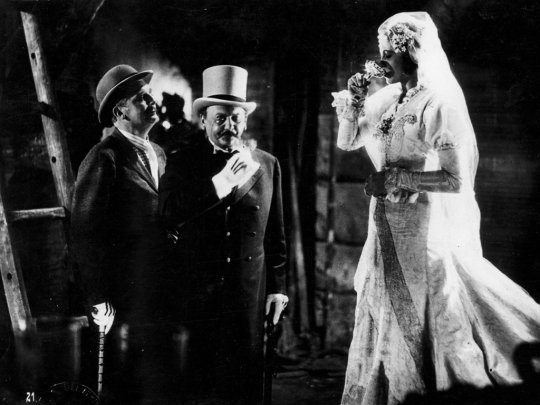
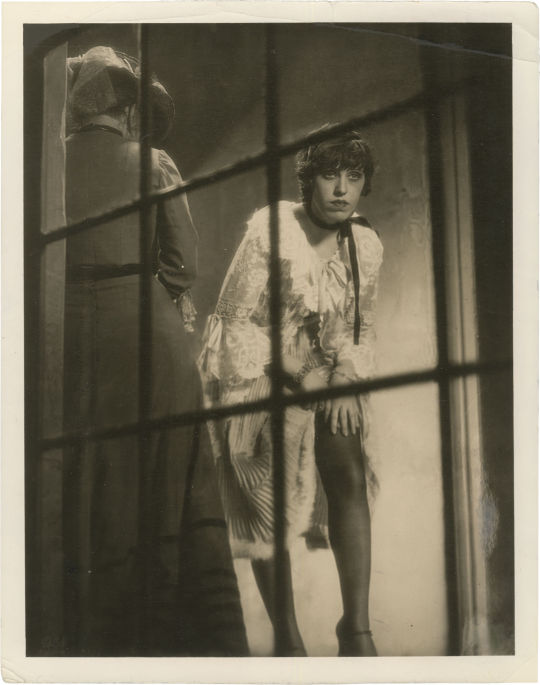
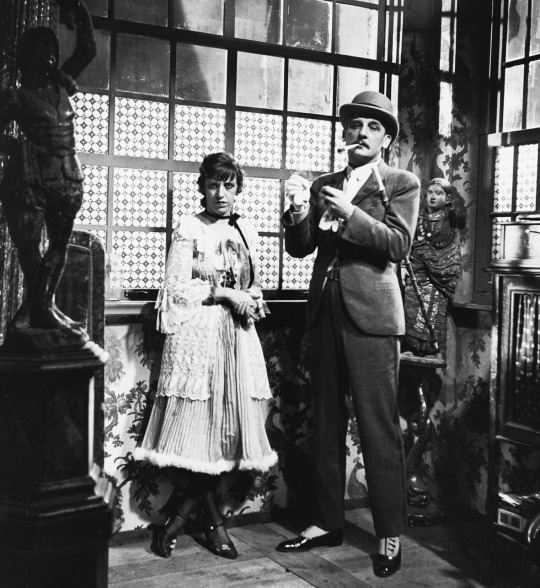
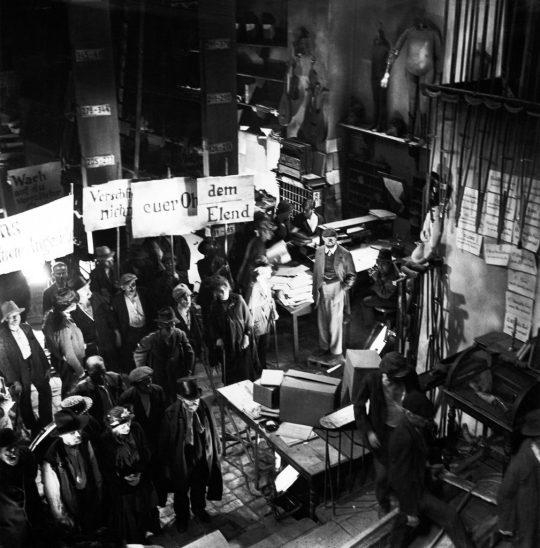
The 3 Penny Opera (Die 3 Groschen-Oper) (1931) G.W. Pabst
May 21st 2023
#the 3 penny opera#die 3 groschen-oper#1931#g. w. pabst#rudolf forster#carola neher#reinhold schunzel#fritz rasp#valeska gert#lotte lenya#ernst busch#vladimir sokoloff#the threepenny opera
8 notes
·
View notes
Text
youtube
1 note
·
View note
Video
youtube
„Seid euch bewußt der Macht“ - Komposition von Hanns Eisler, gesungen vo...
0 notes
Text
youtube
A partir del 1 de enero la mítica y ampliamente versionada (Bobby Darin, Louis Armstrong, y un largo etc) "Mack The Knife", y canciones de Cole Porter y Ma Rainey, entre otras, han pasado a ser parte del dominio público, es decir, han dejado de tener derechos de autor y pueden ser utilizadas y reproducidas de forma gratuita.
Con música de Kurt Weill y letra de Bertolt Brecht, "Maki Navaja" ("Die Moritat von Mackie Messer") fue una de las canciones de la célebre "Die Dreigroschenoper" ("The Threepenny Opera") de 1929. Arriba imágenes de la película de 1931 dirigida por G.W. Pabst. Canta Ernst Busch.
0 notes
Text
[ENG] PARDO - Interview with Luca Marinelli

“Luca Marinelli is a true phenomenon!” This is how Paolo Virzì, who directed him in Tutti i santi giorni in 2012, defined the actor a few years ago. He was absolutely right. Throwing himself body and soul into each of his roles, Luca Marinelli does not limit himself to playing a part, but manages to transform himself completely, creating intense, charismatic, unique characters. From the young introverted mathematician in La solitudine dei numeri primi (2010) by Saverio Costanzo, to Roberta in L’ultimo terrestre (2011) by Gipi; from the criminal in Non essere cattivo (2015) by Claudio Caligari to the cult character of the Zingaro in Lo chiamavano Jeeg Robot (2015) by Gabriele Mainetti; from the proletarian intellectual in Martin Eden (2019) by Pietro Marcello, to the King of Terror in Diabolik (2021) by Manetti Bros; from Nicky, the immortal warrior, in The Old Guard (2020) by Gina Prince-Bythewood, to Pietro, a fervent mountain enthusiast in Le otto montagne (2022) by Felix Van Groeningen and Charlotte Vandermeersch; Luca Marinelli has been able to give life, thanks to his prodigious versatility, to an extraordinary range of characters who all bear the unmistakable sign of his talent.
Maria Giovanna Vagenas: In your current career as an actor there are two important works coming out soon: the television series M. Son of the Century by Joe Wright and The Old Guard 2, by Victoria Mahoney. While waiting to be able to see them, I would like to start by addressing a perhaps less well-known but equally essential side of your work: your debut as a theater director in 2023 with Kafka's Una relazione per un’accademia, for the Festival dei Due Mondi of Spoleto. How did this project, on which you collaborated with the German actor Fabian Jung, come about?
Luca Marinelli: The first idea for this project dates back to ten years ago when I saw Fabian at his graduation performance at the Ernst Busch Academy of Dramatic Art in Berlin. I found it extraordinary, and on that occasion I had already told him: "In my opinion you should recite this text!" Then there was a ten year gap. Towards the end of the pandemic, I proposed to him that we work together on Una relazione per un’accademia. At the beginning we had to be both on stage a bit, later I understood that it would have been more sensible to mount this piece with just one actor and I asked him if he would like to be directed by me.
MGV: What was your approach as a director?
LM: At the beginning of this project I was more of a kind of acting coach - Fabian acts in Italian, even though he doesn't speak it - then I began to understand what it meant to be a director, to take responsibility for everything the public will come to see, to make many decisions and to take care of an entire team. In this context, the exchange of ideas with Fabiana Piccioli, who deals with the light design of the show, was essential: the theatrical piece is in fact a kind of dialogue between the actor and the light, the space and the audience. Being a theater director is also a question of trust. In the cinema the director is very present until the end of the production process, but in the theater you get up to a certain point and then that's it, because the real work, evening after evening, falls to the actors and technicians, that is, to those who are in the scene and around it. The director is no longer part of the performance, he’s almost the first spectator of his own work. It was a very beautiful experience for me, because being "outside", that is, not being on the scene but in front of it, is truly something completely different! In February-March 2025, we will take this show on tour around Italy.
MGV: Do you plan to continue along this path in the future? Is it an experience that has opened up new perspectives for you?
LM: It's a road I'd like to explore, that of theater. I would like to return to the stage as an actor-director, a bit like a master, let's say. I feel that theater is much more accessible to me, while I know very little about the technical side of cinema and for which I have great respect, so for now I don't feel like it.
MGV: You come from a family close to the world of entertainment. It seems that as a kid you watched a lot of movies with your grandmother. I would be curious to know how your desire to become an actor was born in this context.
LM: My father is first and foremost an actor who is also dedicated to dubbing and my grandmother, as you said - a great cinephile. I owe a lot to every member of my family, whether they work in the arts or not. However, I cannot tell you where this desire comes from, each of us has a drive within us, and is attracted by something. Indeed, I grew up watching many films and, thanks to my father, I happened to know this work in various forms. But when you are very young it is difficult to say: I want to do this! I felt very attracted by the world of theater and cinema, by the idea of expressing myself in a way that went beyond words, which approached images, sounds, the body. I wasn't fully aware of it from the beginning, but now I feel that it's exactly this: I love observing an interpreter's body, listening to their voice. I love seeing a group working together and I love teamwork. The profession of actor contained within itself a bit of everything that nourished my curiosity. This desire has been growing more and more. My family has always been very supportive and has never hindered me in anything. Rather, I was the one who hindered myself, until, at a certain moment, I gave myself permission to approach this profession and entered the Silvio D'Amico National Academy of Dramatic Art. They were three wonderful years during which I gave free rein to all my curiosity and desire for expression. The relationship with my class was fundamental and magical. From there, little by little, I moved forward. Almost immediately, cinema arrived with Saverio Costanzo who hired me for La solitudine dei numeri primi together with Alba Rohrwacher. I auditioned while I was still at the Academy and was acting in the final recital Dream of a Summer Night directed by Carlo Cecchi. I finished the Academy and immediately went on set for the first time.
MGV: You found Carlo Cecchi again as an actor on the set of Martin Eden (2019) by Pietro Marcello many years later.
LM: Of course, and it was wonderful to meet again! I consider Carlo my teacher, he is the first who truly made me understand the importance and urgency of this profession. 2012 was the last time I was on the boards of a stage and was with him. Carlo Cecchi had become very fond of us all and with this graduation essay he managed to take us on tour. Basically we did two theater seasons from 2010 until February 2012.
MGV: Are there other directors, among all those you have collaborated with, that you consider to be your teachers?
LM: I met some great directors during my journey, each had their own vision of art, so it's as if I had many different teachers along a single professional journey. I would practically name them all, but I would also name the actors I simply observed in films.
MGV: Between the actors who inspired and influenced you, who would you quote?
LM: For the sake of equality, I only mention the actors of the past. There are many who have struck me but I always evoke Anna Magnani, Silvana Mangano, Marlon Brando and Massimo Troisi. These are the first huge names that come to mind. When I 'met' them on the screen I immediately realized I was faced with something unique and great. I like to mention these four names also because they belong to a moment in my life in which I still didn't know what I would do, but I was drawn towards them.
MGV: Non essere cattivo (2015) was Claudio Caligari's last, poignant and wonderful film, released posthumously. What are your memories of him?
LM: Claudio Caligari was a gigantic meeting for me, from him I learned how important expression and communication, sharing and respect are. I understood how much this profession is life and how much life can be put into it. I witnessed enormous courage and a great knowledge of filmmaking. I also learned the dedication and immense respect that one must have for the public, for what is proposed, for how one interacts with those who come to see a film, without ever putting oneself on a pedestal but being all together. Caligari taught me to never judge myself, nor others, nor the stories one tells nor the characters one plays but that one must stay with them, inhabit them. These are the few things, fundamental for me, that come to mind. Beyond this, every single memory is a source of inspiration and guidance for me. And then the certainty that love and passion are the only things that really keep us here and now, alive.
MGV: In 2019 you played the complex character of Martin Eden in the film of the same name directed by Pietro Marcello, and you won the Volpi Cup at the Venice Film Festival. What did this role mean to you? And what was it like working with Pietro Marcello?
LM: The collaboration with Pietro arose from a secular prayer which has been fulfilled over the years. I was a great observer of his work and his art and finally being able to work together was a great gift, a true exchange based on trust. We all found ourselves in a moment of grace, in a state that allowed us to work with great concentration and dedication together. As for the role, I think Martin Eden is one of the most beautiful male characters of the last century, in one of the most powerful novels ever written. I owe a lot to this character, not only a very prestigious award, but also important artistic and personal growth.
MGV: You have played an extremely wide range of roles, spanning from one film genre to another. Beyond your exuberant talent and the extreme versatility of your performances, what is striking about your acting is the generosity with which you embrace each character, offering your all. How do you prepare your roles?
LM: It's like a kind of love at first sight; I fall in love with the story, with the character and from that moment on I begin to see everything in that direction. It is an almost routine behavior that I have never schematised. If someone were to ask me, "How do you approach a character?" I would answer that I have no idea, but every time I do it more or less in the same way. There is certainly a certain affinity with the director and an involvement in the script and the character. Little by little I'm starting to eat all the information I can find. I am often offered films to watch, and then I discuss them with the director. I love working with imagination and thinking about every element of the character. I like being with the costume designer, working on the costume and then creating the look of my character with makeup and hair. I'm very happy when I can have my say too. As I said before, I fall in love with the character and I begin to see everything in that light. My wife always tells me: "You've already started!" I don't notice but she does! "You've already started!" it means that everything has started to take on that colour, but I don't do it on purpose, I believe that there is a more intelligent, unconscious part inside me that organizes my work. It's a bit like this!
MGV: A few years ago Paolo Virzì, who directed you in Tutti i santi giorni, said of you: "Luca is a phenomenon, he's intelligent, witty, but at the same time he's crazy, he becomes what he's doing. All the great actors have a kind of lack, a defect, they know who they are and therefore they are enthusiastic about becoming the one who proposes to them!" What do you think?
LM: I agree with him, all this is said with deep love and therefore I accept everything he says about me. I love Paolo so much and I think he understood me more than I understood myself. In fact I think none of us really have a clear focus on who we are and what we can be. Of course this is an interview from a few years ago, perhaps now I know slightly more - but only slightly [laughs] - who I am because I am closing, so to speak, the first act of my life, given that this year I will be turning 40!
MGV: Being an actor is a collective profession. Over the course of your career, a very significant bond has been created between you and Alessandro Borghi, with whom you collaborated for the first time in Non essere cattivo and who you met again on the set of Le otto montagne of Felix Van Groeningen and Charlotte Vandermeersch, Jury Prize at Cannes. Could you tell me about your working relationship and your friendship?
LM: I'll start from the beginning of what you said; for me this isn’t a job we do by ourselves. This art doesn’t exist without the other. Even a monologue is not done alone but with the audience. Acting is always a way of expressing oneself and communicating. I adore, as I said before, teamwork, over the years I have happened to work with many wonderful colleagues who have become important friends and then there was this magnificent meeting with Alessandro during Non essere cattivo, a film that carries within itself something sacred due to how it was approached, and due to the strength of the great Claudio Caligari who created it. The two of us found ourselves actors in this extraordinary work which united us so much, creating a deep bond between us which at that moment was needed, let's say, for the film but which the film then gave us for life. Since then this friendship has continued and gone forward, without interruption. After Non essere cattivo for six years we were no longer able to work together, then suddenly another wonderful film arrived, full of love: Le otto montagne and thanks to two fantastic directors, Felix and Charlotte, we managed to make this friendship coincide again on the screen too. Alessandro and I are good together. At work, to put it in a football metaphor, for me it's like I always know where the other guy is so I can make a cross almost with my eyes closed because I know he gets the ball, stops it and shoots it towards goal! We have great chemistry and on set, we don't need to worry too much. I hope we can work together again soon. I happened to see an interview where we said that we promised ourselves not to wait another seven years to do it, but now it's been almost three years already so we have to hurry!
MGV: For a few years now you have also started an important international career by participating in important productions such as The Old Guard by Gina Prince-Bythewood with Charlize Theron which was a huge success on Netflix, the series Trust (2018) by Danny Boyle, written by Simon Beaufoy and starring, among others, Donald Sutherland, and a production for German television: Die Pfeiler der Macht (A Dangerous Fortune, 2016), by Christian Schwochow. How did you experience dealing with all these new production realities?
LM: In every latitude there is a slightly different type of approach but essentially the work is always the same. The thing that always excites me is that, ultimately, we all find ourselves in the common language of acting, of art. I was lucky enough to work with some wonderful international casts, not only every single actor but also the technical departments and directors were wonderful people. Ultimately, the place changes geographically, but the work remains the same.
MGV: As a member of the Jury of the International Competition, what will your evaluation criteria be?
LM: I was just looking at the list of films in competition and judging by the images that accompany them I already like them all, so maybe I'm off to a bad start! [laughs] I don't actually have any specific parameters. I certainly won't judge only the performers, but I will look at the film as a whole. However, for me it is essential to start from the assumption of great respect for the film itself, because every film is a work that requires great efforts from many people and for this reason must be evaluated with consideration. Having said that, I would like to have a good dialogue with the film, an intelligent dialogue on an intellectual and emotional level. In short, I hope that a film leaves me with a thought, a sensation, an emotion.
As usual, sorry for any mistake and my English
#luca marinelli#the old guard cast#tog cast#film#the old guard#intervista#interview#eng translation#eng trans#mine#magazine#rivista#locarno film festival#Pardo
111 notes
·
View notes
Text

Colonel General Ernst Busch and Colonel General Hermann Hoth with Wehrmacht officers on the Russian Front 1942.
#ww2#eastern front#russia#wwii#soviet union#ww2 germany#wwii era#world war 2#second world war#world war ii#world war two#1940s#photography#tumbler#war history#world war#germany#ww2history#wwii history#war#2#world#wars#soldiers#ww2 history#history
32 notes
·
View notes
Text
Peter Lorre + Joan of Arc (Radio)
Bertolt Brecht transformed Joan of Arc into Joan Dark in his musical comedy "Die heilige Johanna der Schlachthöfe" (St. Joan of the Stockyards).
What I didn't realize before was that Brecht based "St. Joan" - written between 1929 and 1931 - on his earlier play, "Happy End" (1929) - which also had Peter Lorre.
Fortunately for us, we can hear Peter's lovely voice in "St. Joan"!
Get Brecht's St. Joan script [English, PDF].
Listen to the 1932 Berlin radio broadcast of "St Joan":
youtube
This broadcast is brought to you by @peterlorres21stcentury's sleuthing work from over a year ago. You can also access the St Joan recording on archive.org per @charlottecremababe.
Lorre played two characters: Sullivan Slift and Graham. As Slift, he is supposed to show Johanna the wickedness of the poor so that she loses her pity.
The broadcast stars Carola Neher as Joan and Fritz Kortner as Mauler. The performers included Helene Weigel, Ernst Busch, Paul Bildt and Friedrich Gnaß.
"In this version of the story of Joan of Arc, Brecht transforms her into "Joan Dark", a member of the "Black Straw Hats" (a Salvation Army-like group) in 20th-century Chicago. The play charts Joan's battle with Pierpont Mauler, the unctuous owner of a meat-packing plant. Like her namesake, Joan is a doomed woman, a martyr and (initially, at least) an innocent in a world of strike-breakers, fat cats, and penniless workers. Like many of Brecht's plays it is laced with humor and songs as part of its epic dramaturgical structure and deals with the theme of emancipation from material suffering and exploitation." Wiki
Intrigued by the aforementioned "Happy End"? Go here:
#peter lorre#peter lorre radio#peter lorre plays#peter lorre stage#peter lorre theatre#bertolt brecht#Happy End#Saint Joan of the Stockyards#St. Joan of the Stockyards#Die heilige Johanna der Schlachthöfe
9 notes
·
View notes
Text




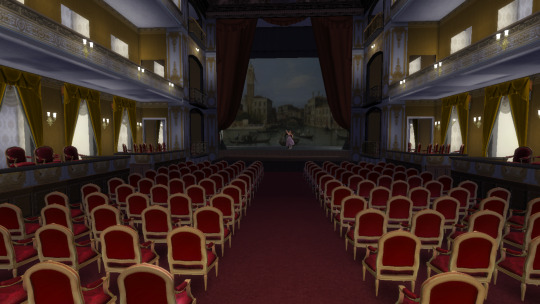
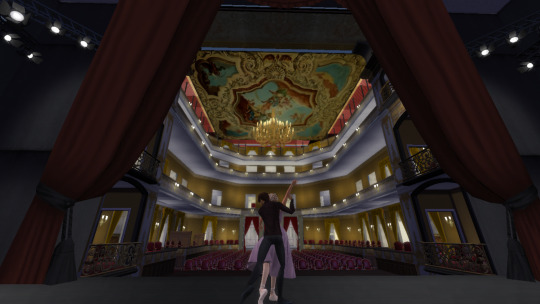
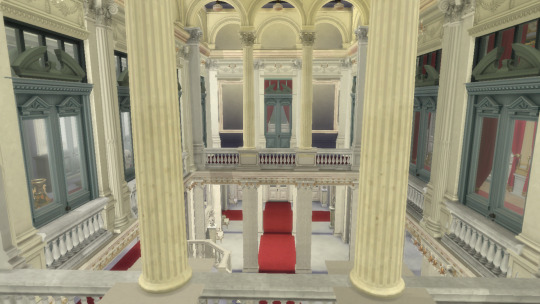
Colon Theatre
The Teatro Colón in Buenos Aires is one of the most important opera houses in the world. Its rich and prestigious history, as well as its exceptional acoustic and architectural conditions, place it on par with theaters such as La Scala in Milan, the Paris Opera, the Vienna State Opera, Covent Garden in London, and the Metropolitan Opera in New York.
In its first location, the Teatro Colón operated from 1857 to 1888 when it was closed for the construction of a new venue. The new theater was inaugurated on May 25, 1908, with a performance of Aida. Initially, the Colón hired foreign companies for its seasons, but starting in 1925, it had its own resident companies - Orchestra, Ballet, and Choir - as well as production workshops. This allowed the theater, by the 1930s, to organize its own seasons funded by the city's budget. Since then, the Teatro Colón has been defined as a seasonal theater or "stagione," capable of fully producing an entire production thanks to the professionalism of its specialized technical staff.
Throughout its history, no significant artist of the 20th century has failed to set foot on its stage. It is enough to mention singers such as Enrico Caruso, Claudia Muzio, Maria Callas, Régine Crespin, Birgit Nilsson, Plácido Domingo, Luciano Pavarotti, and dancers like Vaslav Nijinsky, Margot Fonteyn, Maia Plisetskaya, Rudolf Nureyev, and Mikhail Baryshnikov. Esteemed conductors such as Arturo Toscanini, Herbert von Karajan, Héctor Panizza, and Ferdinand Leitner, among many others, have also graced the theater. It is also common for composers, following the tradition initiated by Richard Strauss, Camille Saint-Saëns, Pietro Mascagni, and Ottorino Respighi, to come to the Teatro Colón to conduct or supervise the premieres of their own works.
Several top-notch maestros have worked consistently here, achieving high artistic goals. They include Erich Kleiber, Fritz Busch, stage directors like Margarita Wallmann or Ernst Poettgen, dance masters like Bronislava Nijinska or Tamara Grigorieva, and choral directors like Romano Gandolfi or Tullio Boni. Not to mention the numerous instrumental soloists, symphony orchestras, and chamber ensembles that have offered unforgettable performances on this stage throughout over a hundred years of sustained activity.
Finally, since 2010, the Teatro Colón has been showcased in a restored building, resplendent in all its original splendor, providing a distinguished setting for its presentations. For all these reasons, the Teatro Colón is a source of pride for Argentine culture and a center of reference for opera, dance, and classical music worldwide.
__________________________________________________________
You will need a 64x64 lot and the usual CC from TheJim, Felixandre, Harrie, Sverinka, SYB, Aggressivekittty, and other marvelous creators!
DOWNLOAD TRAY: https://www.patreon.com/user?u=75230453
(free to play 7/17)


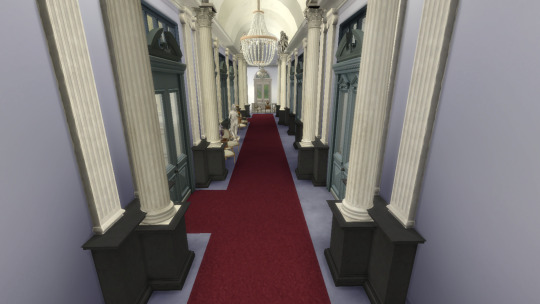
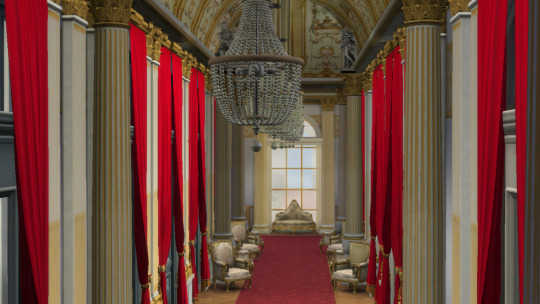


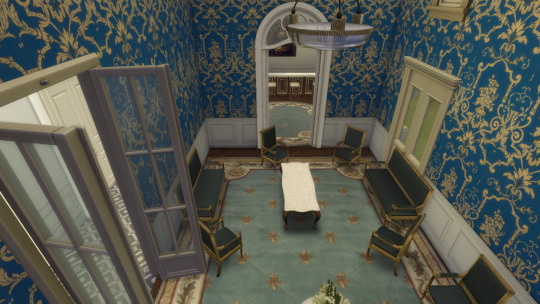
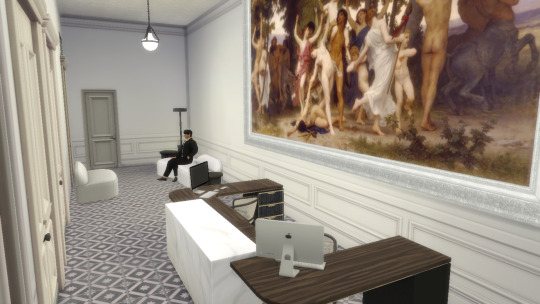




#sims 4 architecture#sims 4 build#sims4palace#sims 4 screenshots#sims4#sims4play#sims 4 historical#sims4building#sims 4 royalty#sims4frencharchitecture
73 notes
·
View notes
Text

Reclining Woman, Ernst Ludwig Kirchner, 1909, Harvard Art Museums/Busch-Reisinger Museum, Gift of Mrs. Margarete Schultz, 49.4 x 59.3 cm (19 7/16 x 23 3/8 in.) Lithograph printed in black ink on off-white wove paper.
22 notes
·
View notes
Text

Cy Twombly by Horst p. Horst, published in Vogue’s 1966 November issue. Thanks Ernst A. Busche for this information
2 notes
·
View notes
Text










Ernst BUSCH
"Oktobersturm / Aufbau"
(2x7". Aurora. 1967) [DE]
youtube
2 notes
·
View notes
Text
Labor Day 2023 September 2, 2023
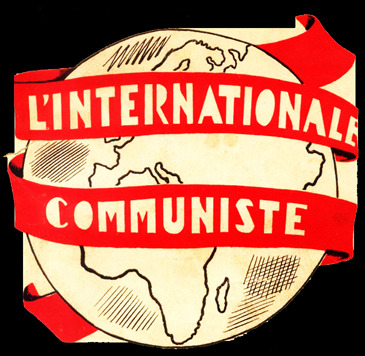
stream on mixcloud
Soul Flower Mononoke Summit - The Internationale FREAK GENES - Let's Get to Work
DJ speaks over The Stumbling Band - The Internationale
The Ex - You Shall Not Pass Almanac Singers - Plow Under Skitsystem - Profithysteri Deathreat - Victim of the Middle Class Myth Red Red Krovvy - Company Job
Gang of Four - Cheeseburger The Dukes - I'm an Unskilled Worker John Handcox - There Is Mean Things Happening In This Land Boots for Dancing - Money (Is Thin on the Ground) The Young Canadians - Well Well Well Zalmen Mlotek,The New Yiddish Chorale, The Workmens Circle Chorale - In Ale Gasn (in every Street) Daloy Politsey (Down with the Police) Neo Boys - Cheap Labor
The Kids - I Wanna Get a Job in the City Qlowski - Lentil Soup Alex Bartha's Hotel Traymore Orchestra - It Must be Swell To Be Laying Out Dead Subhumans - Work Experience
Chuck Brown & The Soul Searchers - We Need Some Money Progressive Labor Party - Mary Got a New Job Ernst Busch & Grigori Schneerson - Das Einheitsfrontlied (Live) Omega Tribe - Young John Billy Bragg - It Says Here
Rose Marie Jun - Chain Store Daisy Dirt - Unemployment Dick Gaughan - Workers' Song The Dils - Class War The Beat - Work-a-Day World Aunt Molly Jackson - Ragged Hungry Blues part 2
Manhattan Chorus, Elie Siegmeister, Mordecai Bauman & Maudy Bauman - On the Picket Line Passion Day - Weapon of Work MDC - I Hate Work Cherry Cheeks - Not My Job
Chumbawamba - One By One
#radio#community radio#wprb#punk#music#post punk#playlist#labor day#anarcho punk#folk#labor music#spanish civil war#communism#socialism#labor movement#showtunes#1930s pop#new wave
3 notes
·
View notes
Photo

Rudolf Forster and Carola Neher in The Threepenny Opera (G.W. Pabst, 1931)
Cast: Rudolf Forster, Carola Neher, Reinhold Schünzel, Fritz Rasp, Valeska Gert, Lotte Lenya, Hermann Thimig, Ernst Busch. Screenplay: Béla Balász, Léo Lania, Ladislaus Vaida, based on a play by Bertolt Brecht adapted from a play by John Gay. Cinematography: Fritz Arno Wagner. Art direction: Andrej Andrejew. Film editing: Hans Oser. Music: Kurt Weill.
In 1928, Bertolt Brecht and Kurt Weill transformed John Gay's 18th-century Beggar's Opera into Die Dreigroschenoper, one of the most celebrated works to come out of Weimar-era Germany, so when sound came to film it was inevitable that the musical should become a movie. But both Brecht and Weill were unhappy with what Pabst decided to do with both the plot and the songs, so they sued. Brecht lost, but Weill won, with the result that although songs were cut from the film, no new music by other composers was added. Brecht's objections seem to be more about a loss of control over the screenplay than about any ideological shift: If anything, the ending of the film goes even further left than Brecht's did, with the crooks and corrupt officials of the play becoming bankers. Pabst's direction is sometimes a little slow and stiff: He had never done a musical film before, and the action between songs often seems to lag. But the musical numbers that remain -- which include the well-known "Moritat" or "Mack the Knife," Lotte Lenya's delivery of "The Ballad of the Ship With Fifty Cannons," and "The Song of the Heavy Cannon" -- are well-handled. The cast includes Rudolf Forster as Mackie Messer (i.e. Mack the Knife), Carola Neher as Polly Peachum, Fritz Rasp as Peachum, and Lenya as Jenny. It's striking to see that, as in Fritz Lang's M, made the same year, the underworld is presumed to consist of syndicates of thieves and beggars. The cinematography is by Pabst's frequent collaborator, Fritz Arno Wagner, and the splendid sets are by Andrej Andrejew.
2 notes
·
View notes
Text
Beer Events 11.18
Events
Women’s Christian Temperance Union founded (Cleveland, Ohio)
William Dannals patented a Bottle Filling Machine (1890)
Philipp Forg patented a Bung and Tapping Device for Beer Barrels (1902)
British war tax on beer imposed to raise revenue (1914)
John F. Oertel died (1929)
Robert Schock patented a Lauter Tank (1941)
Calvin & Hobbes debuted (1985)
Government warning labels required on beer bottles & cans (1989)
Fugeia patented Arabinoxlyo-Oligosaccharides in Beer (2008)
InBev Completes Buyout of Anheuser-Busch (2008)
Breweries Opened
Rettig Brewing (Pennsylvania; 1901)
Brewhouse Ernst August (Germany; 1986)
Odell Brewing (Colorado; 1989)
Great Northern Restaurant & Brewery (North Dakota; 1995)
Kusano Craft Beer (Japan; 1997)
Granite City Food & Brewery (Cedar Rapids, Iowa; 2003)
All American Brewing Co. (Missouri; 2008)
0 notes